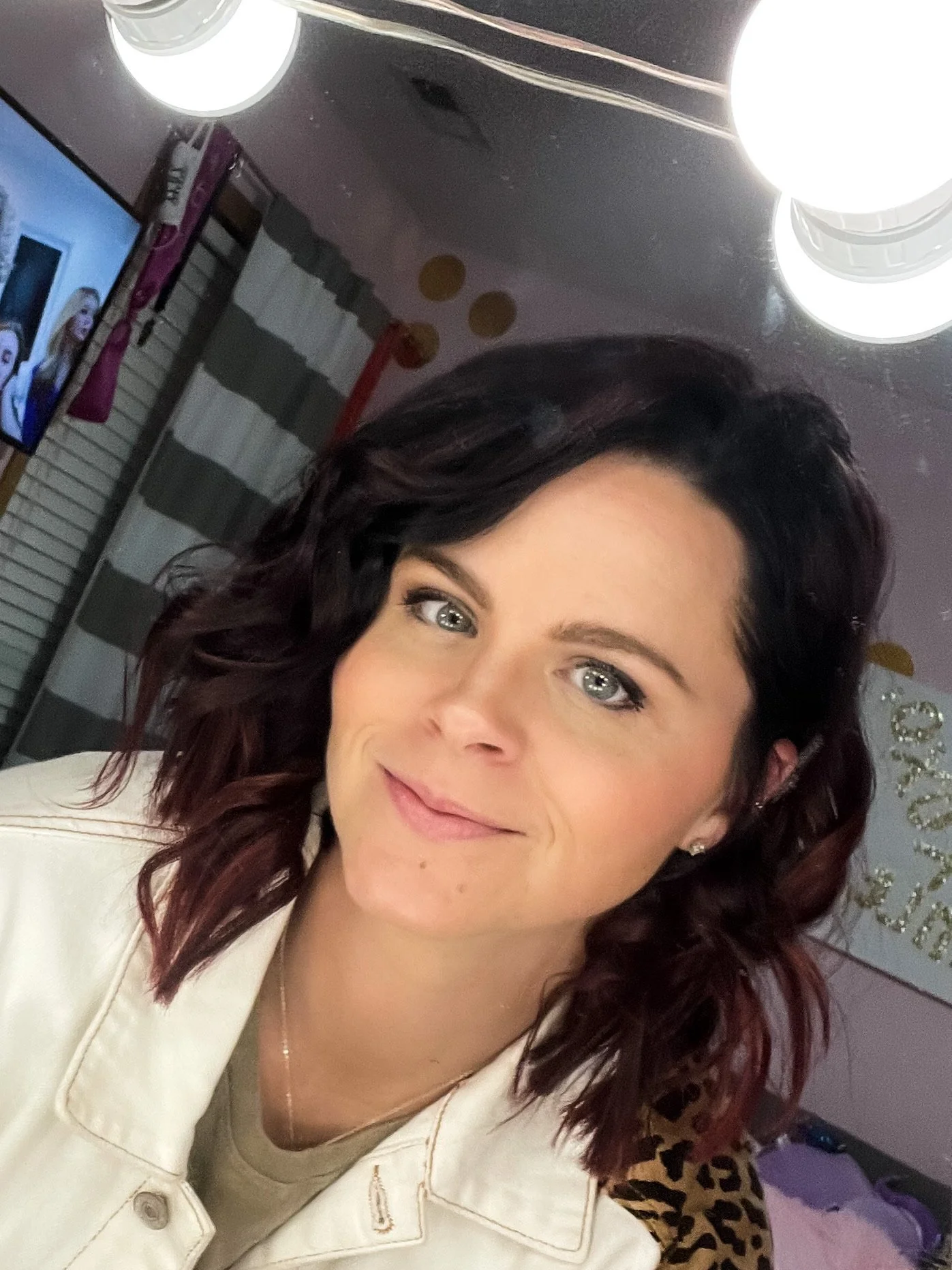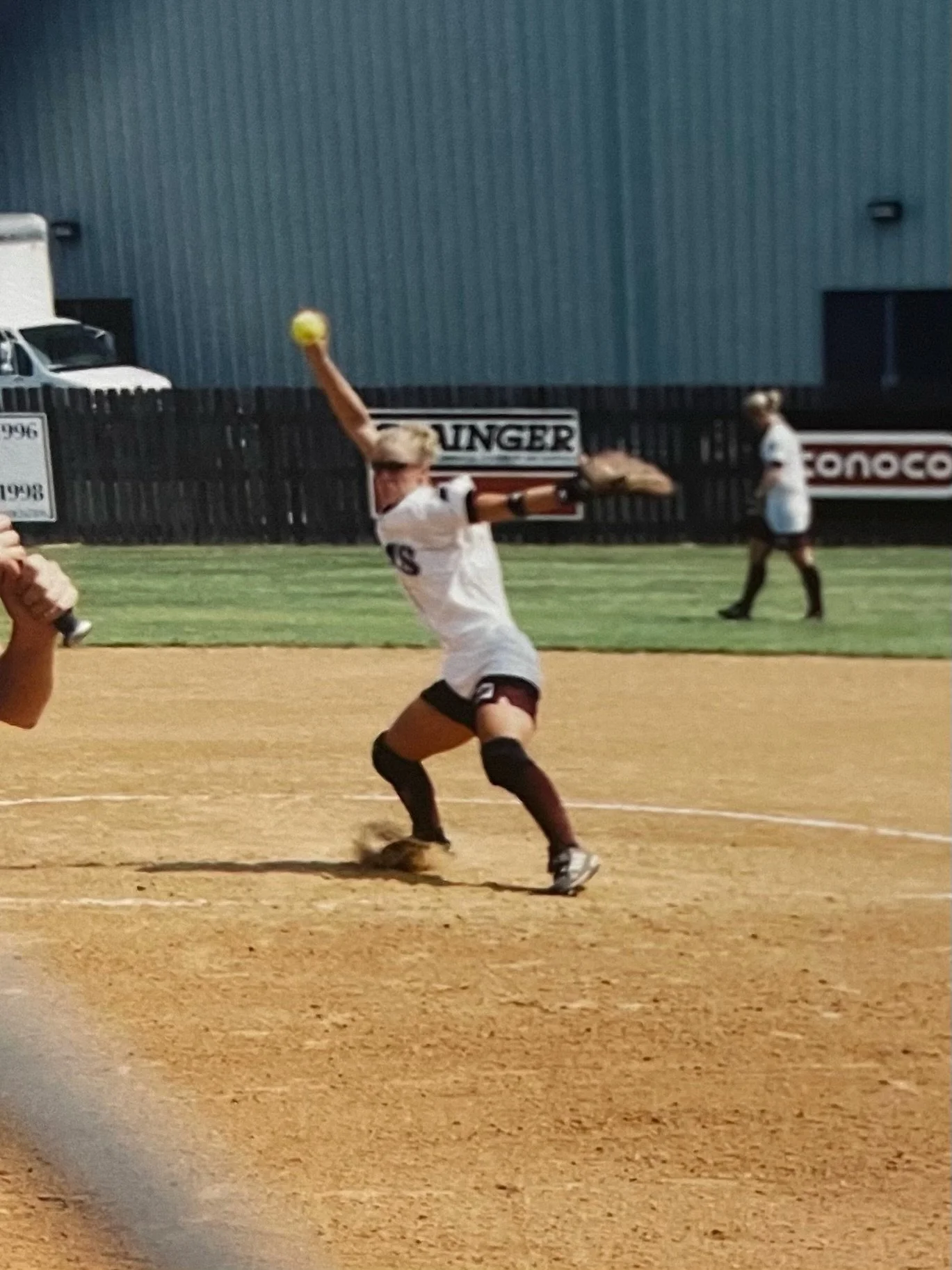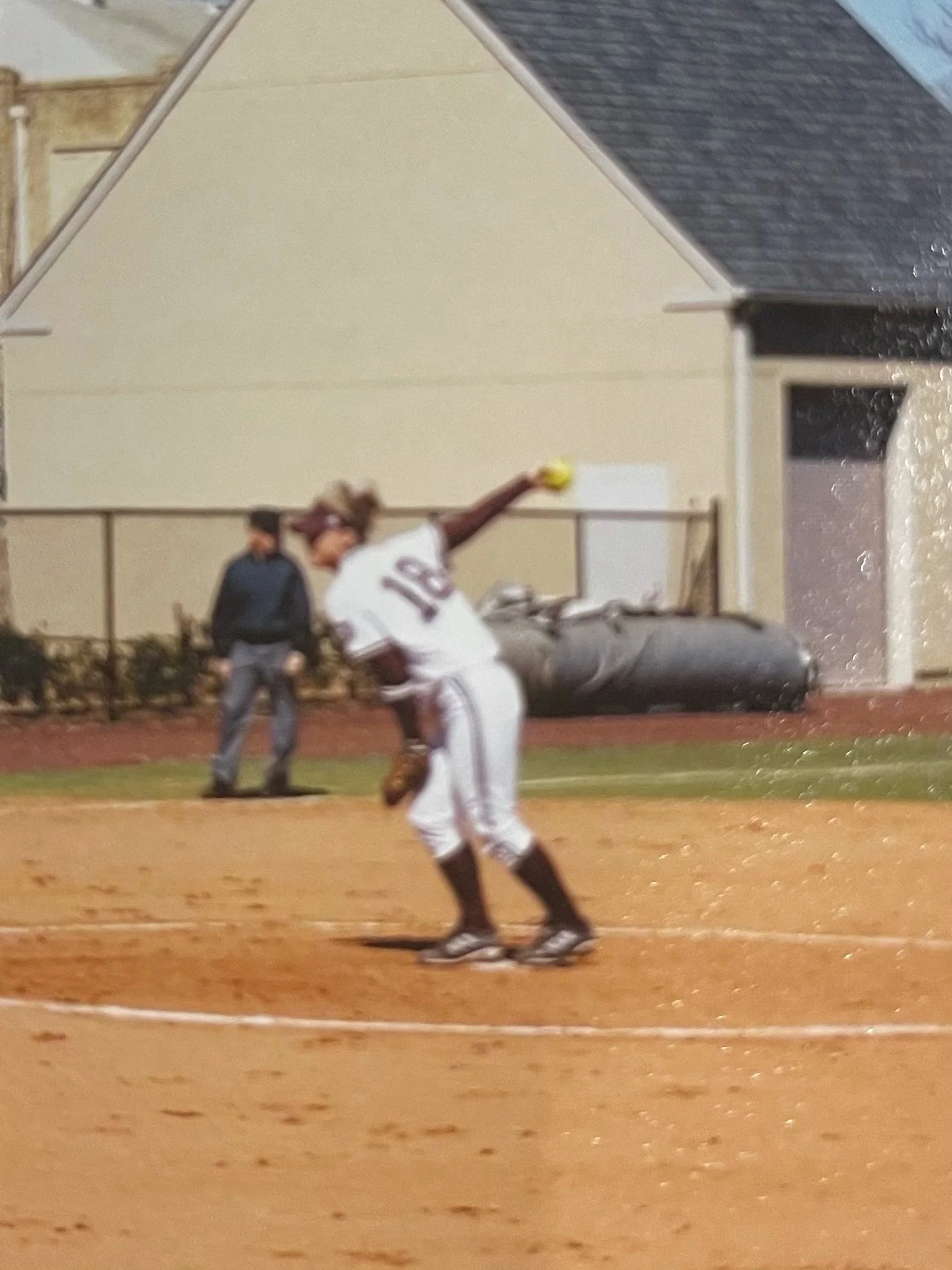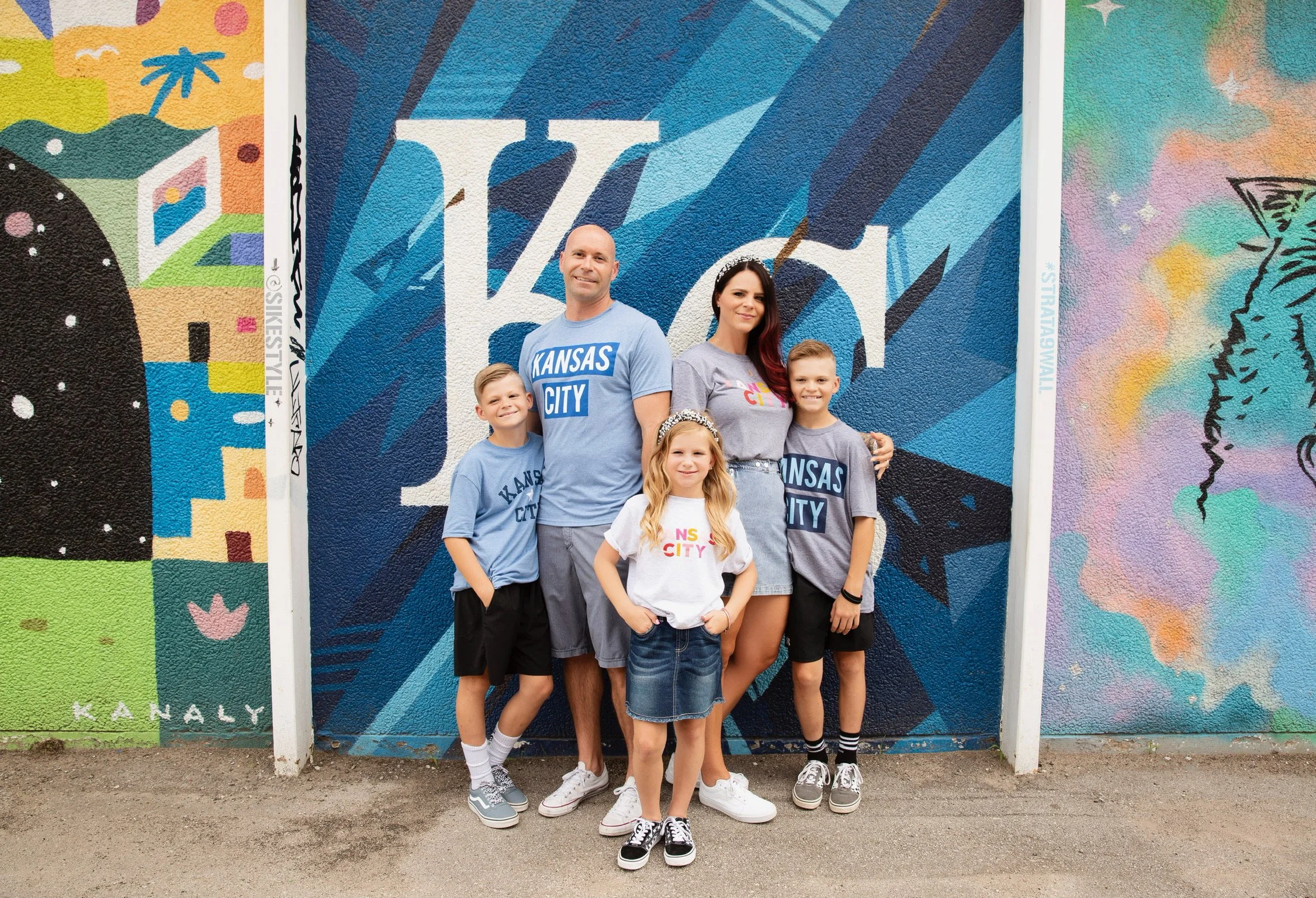Interview with Lindsey Wrobleski
Lindsey Wrobleski played softball at Missouri State as a pitcher and first base. She played there for 2 years then retired from the sport. Her junior year she transferred to Mizzou and finished out her degree. Lindsey has a degree in Textiles and Apparel Management (which is just like Fashion Merchandising). She currently works for herself in the health and wellness supplements industry and does pitching lessons. She has been married to her husband for 14 years and they have 3 kids. Her husband is a pilot so they are a very busy family with Lindsey taking care of things while her husband is working. Their kids are 12, 10, and 7. And they are heavily involved with sports and Lindsey helps coach their teams. At home they have a dog and a rabbit, a newly installed pool that they hang out at, and they love to travel.
Below I have written most of what we talked about but you can listen to the full podcast HERE.
Q: When did you start playing sports?
A: I started dancing when I was really little. When I was 8 I asked to go to powder puff softball try outs.
Q: When did you start playing competitive?
A: I grew up just outside of Kansas City Missouri in Blue Springs. We were one of the first 10U teams in the area. I did play basketball competitively for one season. My senior year of high school I tried out for the coed cheerleading team. I was doing softball and cheerleading that year.
Q: How has being a college athlete influenced your kids to get into sports?
A: I was so influenced by sports that I feel like sports need to be a part of a kid’s childhood. We starting putting them in things when they were young. They’ve all taken to their own things. To me, it’s non-negotiable that you have to be involved with something. It doesn’t have to be sports but they all chose sports. It teaches them. You learn so much and it is a must do.
Q: How did being an athlete and then retiring from sports after 2 years in college have an influence on your degree path?
A: When I first went to college, I didn’t know what I wanted to do. I always said I wanted to get married and have kids and college was just for the experience. I went to school to play softball, I was undeclared and took some business classes. When I first went on the visit, I remember I asked some of the players if they were involved in greek life and they laughed at me. That’s when I realized I won’t have much time to be doing a whole lot of things. I just took business courses there. When I went to Mizzou, I looked at what credits would transfer the easiest and also what would I be interested in doing. I’m not super business minded in the traditional sense but fashion was something I was interested in once I left sports. I haven’t used my degree a whole lot but I did work for Nestle for 7 years as a retail sales rep. I might have used it some there. I use it more in personal life just buying things with cost per wear, things we learned in college. It helps you buy expensive things and not feel bad about it. I enjoy the entrepreneur world. I like to work for myself. I am blessed to find a path that affords that to me.
Q: How did playing competitive sports shape who you are today?
A: I would say in pretty much every way. It helps you learn how to work through adversity. How to be mentally tough. There are so many things in life that require me to draw on things that I learned on the field. Working with all kinds of people. In my first big girl job interview my shoe in was that I was an athlete. The interviewer was very interested in the fact that I played college softball and that was pretty much all that the interview consisted of. It really helps with getting jobs and in life.
Q: You told me about your disease you have in your ankle. What has your journey been like with that? Have you ever faced any other injuries or setbacks?
A: We discovered the injury in my ankle because of something else. I’m basically bone on bone in my ankle. I had to sit out for about 6 months to let it heal to avoid surgery when I was about 12. My dad had me pitching off of a drum stool. I was putting in time and still practicing but not able to play in games which was the fun part. That was the most impactful injury. I had back issues so I was having to see chiropractors, going to massage therapists, going to the training room and being worked on a lot. I could barely tie my shoes but I could pitch in a softball game because I had to. I was working through that adversity, digging deep and finding the strength. You also don’t want to sacrifice your whole life. There are more important things in life than a game. With each one of my kids, my back was hurting worse and worse. It definitely held me back a lot in life and in doing the things I want to do and that was difficult.
Q: What was the transition out of playing competitive sports like for you? What did you do in your newfound free time?
A: I think for me, my story is a little different having retired from the sport. I was in a place in life with some burnout and not being a great fit at the school I was at. I didn’t want anything to do with the sport right afterwards. After transferring to a new school, softball was the only way I could think of to meet new people. I played some intramural softball for a little bit which was weird because they just played for fun and I’m super competitive. I did that for a little bit and I played in one fastpitch game with an old coach of mine. When I came off the field I told my mom it was too soon. I stepped away from the sport and took the time to just be a student for awhile. I had a blast in Columbia. I coached a 14U and 16U team after college, which was me dipping my toes back into the sport. It was fun but I did take a long break from the sport after that. I didn’t go anywhere near it again for about 8 years.
Q: What was one of your favorite moments while competing?
A: I absolutely loved high school ball, we won the state championship my sophomore year. That was definitely a highlight. Another moment is when we played in a 35 inning game. It lasted over 2 days because it started raining in like the 17th inning so we continued it the next day and we lost 1-0. I learned a lot from that but I still hate extra inning games to this day. I think it tied a record so that’s kind of cool.
Q: What advice would you give to someone who is recently done playing a sport?
A: I would just say to try a lot of new things. Get yourself out of your comfort zone, honor and pull from what you’ve learned on the field or on the court or wherever your sport is. Throw yourself in all kinds of new things and find what makes you tick outside of your sport you’ve been in your whole life.
Q: What advice would you give to someone who is currently playing a sport?
A: Don’t take it so seriously. It is just a game. There are things worth crying for and striking out isn’t one of them. You have a moment to reflect on what just happened, but you have to move forward. It doesn’t take talent to hustle. You can be not as great of an athlete as the next person but if you have hustle I will look at you all day.
Q: Do you have anything else to add?
A: Sports are a huge part of development for kids. if you can play a sport and not take it so seriously, not take it as a life or death situation, you’re going to learn so much. You’re going to be better for it throughout your life.
If you have any more questions for Lindsey, please leave comments below or contact me. If you or someone you know is struggling, please call the Suicide Hotline. It’s toll free and available 24/7 at 800-273-8255.
Once An Athlete’s mission is to provide resources and support for current and former athletes. Please support our mission by making a donation.
Are you or someone you know currently struggling with what happens in life after sports? Or did you already go through that transition to life after retiring competitive sports and wish you had more resources and support? Have you ever wondered, “what do athletes do after they are done playing sports? What’s next after sports?” Do you feel like you dedicated so much to your sport and you don’t know what to do now that you’re done competing? You’re not alone. Check out the site and join us in the journey. Once an athlete, always an athlete.
More blog posts with softball players:





